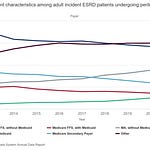This Signals audio overview gives you the highlights from our expert Q&A on kidney nutrition so you can listen while you work or on the go.1
Summary
This part of our expert interview series delves into nutrition’s role in kidney health, offering insights from a group of registered dietitians and experienced renal nutrition experts. The group shared their perspectives on personalized nutrition approaches for patients with chronic kidney disease (CKD). They also discussed challenges such as limited access to dietitians, insufficient insurance coverage, a lack of provider buy-in, low utilization and patient awareness. A few solutions proposed include expanding Medicare coverage, improving provider education, and leveraging technology for telehealth and education. Finally, the Q&A explores promising trends, like value-based care models and new dietary interventions for people managing kidney disease.
Meet the Experts
Rory Caswell Pace, MPH, RD, CSR, FAND, FNKF
Bethany Keith, MS, RDN, LD, CNSC
Karla Rippchen, MBM, RDN
Jill Sher, RDN, LD
Cory Zenner, RD
Resources
I asked these experts to share their favorite resources and recommendations where readers can learn more about these topics. Here’s what they shared.
For Providers
Kidney Disease for Health Professionals (NIDDK)
CKD in the United States, 2023 (CDC)
MNTWorks Toolkit (eatright Pro)🔒
For Patients
Research
Medical Nutrition Therapy for Patients with Non-Dialysis-Dependent Chronic Kidney Disease: Barriers and Solutions (JAND, 2018)
Medical Nutrition Therapy Access in CKD: A Cross-sectional Survey of Patients and Providers (Kidney Medicine, 2020)
Prehemodialysis care by dietitians and first-year mortality after initiation of hemodialysis (AJKD, 2011)
Karla’s list of 40+ studies across kidney nutrition topics (See list here)
Discussion
Here are a few insights and perspective from around the community on this topic. Subscribe to Signals to join the discussion in the comments below:
Sara Eve Schaeffer, MBA, MA, RD: “And don’t forget that MNT is covered post-transplant!”
Jessica Panetta, MA, RD: “Promotion of MNT is great. Conversion is better. 1) Physicians need to know about MNT + actively refer to RDs. 2) Individuals referred to RDs then need make the appointment, show up, and act on the recommended interventions. This is a multifaceted issue that could warrant an entire article! To connect it back to the original message— awareness and education are crucial catalysts for change here, in my opinion.”
Rebecca Baranoff, MSW, CCA, CRC, CPC: “When I worked in dialysis it seemed MNT was used only in short studies and the margins in which a patient qualified for the study were really narrow. It’s possible though that the new guidelines have set different margins for this treatment. The other thing that happened was the patients that were given MNT PO were older patients with cognitive deficits. So how do we educate patients so they really understand why they are getting this therapy?”
Bethany Keith, MS, RDN, LD, CNSC: “I believe that connecting CKD patients with RDs goes hand in hand with early identification of CKD. Many people don’t know that they have kidney disease until stage 3 or later, when they could have been make dietary changes earlier on to help slow the progression of CKD. Access to renal dietitians is slowly increasing due to the rise of telehealth in the post pandemic world. Now many people can talk to a renal dietitian from the comfort of their own home, however people in rural areas may not have access to internet or be aware of telehealth options. I think the potential interventions that Jimenez and colleagues outlined are spot on!”
Rory Caswell Pace, MPH, RD, CSR, FAND, FNKF: “Dietitians ABSOLUTELY have the ability to impact patient activation. Because MNT includes engaged counseling to facilitate health-related behavior change, there is significant opportunity to increase patients'/clients' health literacy and self-care skills, which are captured in the PAM.”

![Signals From [Space]](https://substackcdn.com/image/fetch/e_trim:10:white/e_trim:10:transparent/h_72,c_limit,f_auto,q_auto:good,fl_progressive:steep/https%3A%2F%2Fsubstack-post-media.s3.amazonaws.com%2Fpublic%2Fimages%2F4d588ac1-7fac-4bd4-829d-fc7b4e8f1326_1512x288.png)

















Share this post